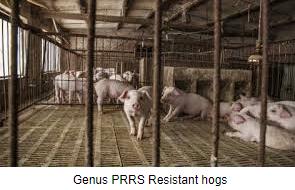 At this time, primary breeders of egg production and broiler stock have collectively rejected genetic modification based on the obvious potential for consumer rejection of products. This has limited research into prevention of disease in chickens and turkeys by applying gene deletion. There is even less motivation to achieve advances in productivity through introduction of xenogenes as with the AquaBounty™ salmon.
At this time, primary breeders of egg production and broiler stock have collectively rejected genetic modification based on the obvious potential for consumer rejection of products. This has limited research into prevention of disease in chickens and turkeys by applying gene deletion. There is even less motivation to achieve advances in productivity through introduction of xenogenes as with the AquaBounty™ salmon.
Gene deletion applying CRISPR technology offers benefits from creating strains that are refractory to disease. Genus plc (LSE: GNS) in the U.K. is a major supplier of genetics for the swine and dairy industries recently obtained approval from Colombia to market a genetically modified strain of hogs resistant to porcine reproductive and respiratory syndrome (PRRS). Genes encoding for a protein necessary for the PRRS virus to enter host cells and replicate was removed. Modified pigs are resistant to the disease responsible for serious losses in reproductive efficiency and depressed growth rate in weanlings.
Genus has submitted an application to the FDA and anticipates approval for their genetically modified strain of hogs during 2024. Although there is a vaccine available to suppress PRRS using a strain that is genetically resistant offers advantages to producers given that the deletion of the specific gene does impair performance.
 The commercial availability of PRRS-resistant hogs can be related to the work conducted in the U.K. to produce a strain of chickens resistant to avian influenza. This was accomplished by deleting genes encoding for three proteins designated ANP 32A, B and C that are necessary for avian influenza virus to replicate in host cells. Preliminary experiments demonstrated that of ten gene-deleted chickens only one could be infected by inoculation with avian influenza virus although this subject did not transmit the virus to contact birds. Genetically modified chickens are infected when subjected to high doses of avian influenza virus.
The commercial availability of PRRS-resistant hogs can be related to the work conducted in the U.K. to produce a strain of chickens resistant to avian influenza. This was accomplished by deleting genes encoding for three proteins designated ANP 32A, B and C that are necessary for avian influenza virus to replicate in host cells. Preliminary experiments demonstrated that of ten gene-deleted chickens only one could be infected by inoculation with avian influenza virus although this subject did not transmit the virus to contact birds. Genetically modified chickens are infected when subjected to high doses of avian influenza virus.
This study appears to be more of academic than potentially commercial significance since it is unknown whether the deletion of the genes coding for the protein will have other effects including growth and reproduction. Virologists have also raised concerns over the ability of avian influenza virus to develop new mechanisms to overcome the genetic modification. There is also concern that mutations in avian influenza viruses as a result of gene deletion in the primary avian host may result in a strain capable of infecting humans.
Notwithstanding potential advantages from gene deletion to create disease resistance, it will still be necessary to overcome consumer concerns over perceived risks as evidenced by a three- decade rejection by consumers and government regulators of GM crops. For the foreseeable future, genetic modification offers no commercial advantages for the world’s poultry producers with respect to suppression of avian influenza, gender regulation or enhanced growth. This reality should influence journalists hyping “the next big thing” and their editors posting misleading headlines.